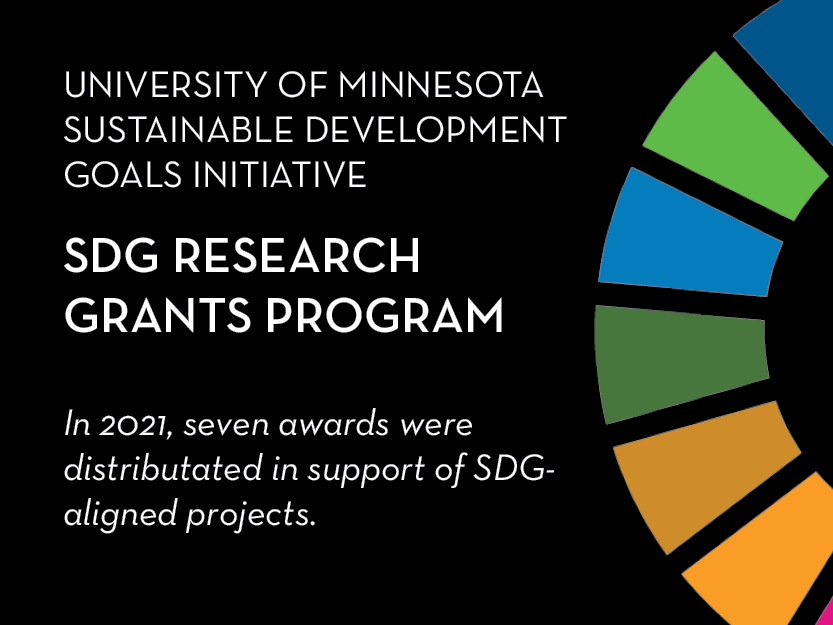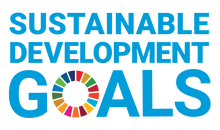
The University of Minnesota (U of M) Global Programs and Strategy Alliance (GPS Alliance) is pleased to announce the award, as part of its systemwide initiative focused on the Sustainable Development Goals (SDGs), of approximately $120,000 to seven research projects that align with the United Nations’ 2030 Agenda for Sustainable Development, the University’s strategic priorities and needs identified by communities.
The awarded projects include teams from two U of M campuses, seven departments and six colleges. In total,10 SDGs are represented across the seven projects.
The projects were selected after a competitive proposal process that included an interdisciplinary committee reviewing the proposals and providing recommendations for funding. Research proposals were required to align with the SDGs, and priority was given to projects that connect local and global issues.
Civil Society Advocacy, Children with Disabilities, and the Sustainable Development Goals
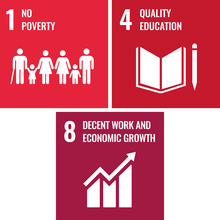
Christopher Johnstone, Principal Investigator
Department of Organizational Leadership, Policy, and Development
College of Education and Human Development, U of M Twin Cities
We often associate ending poverty with the opportunity to attend and benefit from formal education. SDG#4 codifies the connection of education and life opportunities by calling for “inclusive and equitable quality education and…lifelong learning opportunities for all.” This study seeks to identify the role of Organizations for Persons with Disabilities, also called Disabled Persons Organizations (DPOs) in policy advocacy toward inclusive and equitable education (SDG#4) with the long-term goal of ending poverty (SDG#1) and developing decent work opportunities (SDG#8) for persons with disabilities worldwide.
Reducing Waste in Production and Consumption of Clothing through Intelligent Decision-Support Tools
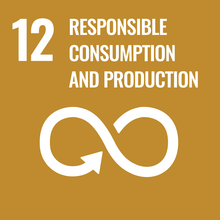
Lucy Dunne, Principal Investigator
Department of Design, Housing and Apparel
College of Design, U of M Twin Cities
The fashion industry is one of the biggest polluters and exploiters of human resources in the world, but also one of the least efficient: our research shows as little as 58 percent of clothing produced is sold, and as little as 4 percent of clothing sold is used regularly. Industry efforts to improve sustainability often focus on solutions like material choices or circular design strategies, but rarely consider tools for sustainably reducing production and consumption. Our approach formalizes the tacit knowledge of apparel design to inform decision-making tools to augment human intelligence with machine intelligence, and minimize wasteful production and consumption (SDG#12).
Storying and Story Care: Building a Model to Transform Self and System to Eliminate Racism and Achieve SDGs Addressing Health, Equity, Peace, and Justice
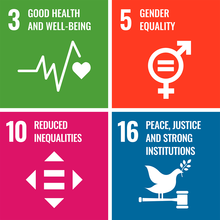
Lauren Martin, Principal Investigator
Department of Population Health and Systems Cooperative
School of Nursing, U of M Twin Cities
Racism in healthcare kills and traumatizes, and directly contravenes the United Nations Sustainable Development Goals “to free the human race from the tyranny of poverty and want and to heal and secure our planet.” This project will formalize a promising intervention to eliminate racism in healthcare. An African-American nurse-leader at Gillette Children’s Specialty developed the “storying” intervention that yielded positive outcomes among diverse providers-patients. Practice-based evidence suggests this translates into “story care” which facilitates a more authentic connection with patients and their lived experiences, including racism in healthcare. This takes critical steps forward toward achieving SDG#3, #5, #10, and #16 and sets a foundation for future piloting and scaling of the “story care” model.
Developing Community-Based Climate Messengers: Training and peer learning to expand capacity and opportunities for climate communication, education, and action across Greater Minnesota
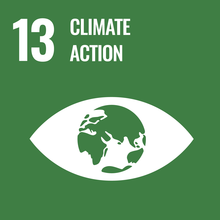
Heidi Roop, Principal Investigator
Department of Soil, Water, and Climate
College of Food, Agricultural and Natural Resource Sciences and Extension, U of M Twin Cities
The U of M Extension Regional Sustainable Development Partnerships and Minnesota Climate Adaptation Partnership seek to pilot and test a rigorous program for training and supporting trusted community messengers to engage in climate change conversations across Greater Minnesota. A cohort of 15 diverse messengers will receive training in solutions-oriented climate change communication and mentorship for piloting their messaging at community meetings. The training will build on existing evidence-based climate communication training models to empower local messengers with the resources, confidence, and knowledge needed to integrate climate change into community conversations and actions. Others working toward greater climate engagement (SDG#13) in Minnesota can scale and replicate this approach.
Outbound/In: Racialized Bodies and the (Un)seen Borders of Belonging
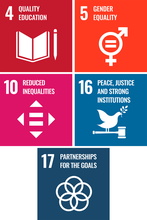
Nida Sajid, Principal Investigator
Department of Asian and Middle Eastern Studies
College of Liberal Arts, U of M Twin Cities
Despite a century-long history of migration, the Sikhs have remained an underserved and underrepresented community in the United States (US). As a collaborative and participatory film project, Outbound/In develops multiple SDGs through its dual focus on global routes and local roots of Sikh identity and its racialization both in India and the US. It explores the multiple dimensions of international migration of Sikhs from Punjab, India through audio-visual storytelling in order to foreground authentic voices from the community. The team will build an expansive interdisciplinary framework through which they will analyze international migration, transnational communities, and underlying factors that marginalize immigrant bodies (SDG#4, #5, #10, #16 and #17).
Our People, Our Climate: Visualizing Climate Change Through Hemispheric Dialogue
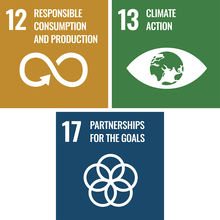
Olaf Kuhlke, Principal Investigator
Department of Geography and Philosophy
College of Arts, Humanities and Social Sciences, U of M Duluth
This project will create a curriculum for a synchronous 8-week online course on the visualization of climate change in Arctic and tropical locations, namely Canada (Nunavut), Honduras, Mexico and Colombia. The program will engage high-school students and young adults in learning about two interrelated components: a) climate change evidence and visualization, using and contributing to the Climate Visuals framework, and b) professional photography/videography. Students will learn about existing evidence for climate change in different biomes across the globe, use the key principles of visualizing climate change, and practice how to use photography and documentary filmmaking to collect evidence of climate change in their communities, ultimately creating professional photography and short 3-minute documentary films (SDG#12, #13 and #17).
Bridging the Digital Divide in STEM through an Immersive Local and Global Maker Program
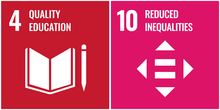
Abimbola Asojo, Principal Investigator
Interior Design, Department of Design, Housing and Apparel
College of Design, U of M Twin Cities
Lesa Clarkson, Co-Principal Investigator
Mathematics Education
College of Education and Human Development, U of M Twin Cities
The Bridging the Digital Divide in STEM through an Immersive Local and Global Maker Program uses an inclusive lens of cross-cultural fractal to promote learning for grades 4-12 Minnesota Black, Indigenous and People of Color (BIPOC) students and underprivileged youth in the Makoko slum in Lagos, Nigeria. Our project-based making exercises focus on the intersection of design and mathematics and draw on patterns from ethnic minority communities where student participants will come from. Students will learn about design and STEM careers through immersive hands-on experiences in 3D modeling, simulation, making and digital fabrication. Our work aligns directly with SDG#4 and #10 aimed at ending poverty and ensuring prosperity for all.
---
About the UMN Sustainable Development Goals Initiative
The UMN SDG Initiative seeks to support and promote transdisciplinary research, teaching, and partnerships to advance sustainable development in Minnesota, the U.S., and the globe through grants, information, and opportunities linked to SDG targets and indicators.
The GPS Alliance is partnering with the Office for Public Engagement and other University centers, institutes, and research groups across all five University of Minnesota system campuses in developing this initiative.
About the United Nations Sustainable Development Goals
The 2030 Agenda for Sustainable Development was adopted by all United Nations member states in 2015 as a 15-year plan for global sustainable development. The framework includes 17 Sustainable Development Goals (SDGs) that provide a shared blueprint for peace and prosperity for people and the planet, now and into the future and drive efforts at local, national, and global partnership levels. The SDGs offer an inherently integrative and interdisciplinary approach highlighting linkages between ending poverty, improving health and education, and addressing climate change and other environmental degradation.
